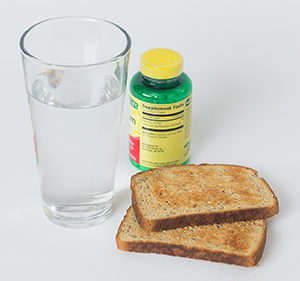Taking Potassium
Taking Potassium

The reason I’m taking potassium is:
___________________________________________
Medicine tips
Read the fact sheet that comes with your medicine. It tells you when and how to take it. Ask for a medicine fact sheet if you don’t get one.
Always take your potassium along with food.
If you take a long-acting tablet or capsule, swallow it with a full glass of water or juice. Do not crush or chew it unless you’re told it’s OK to do so.
If you take potassium as granules, powder, fizzing tablets, or liquid, you must dilute it in at least 1 cup (8 oz) of cold water or juice. Wait for fizzing to stop before drinking the liquid. Then sip slowly.
If you miss a dose, take it as soon as you remember—unless it’s almost time for (a few hours before) your next dose. If so, skip the missed dose. Do not take a double dose.
For your safety
Ask your doctor or pharmacist for a list of foods that contain potassium. Potatoes, orange juice, and bananas are some of the foods that are very high in potassium. Talk with your healthcare provider before changing the amounts of foods you eat that are high in potassium. Ask your provider if you need to avoid grapefruit juice.
Do not use salt substitutes or eat foods labeled low-sodium unless your healthcare provider says it’s OK. Many contain extra potassium.
Tell your healthcare provider or pharmacist before taking any other prescription or over-the-counter medicines. This includes vitamin and mineral supplements and herbal remedies.
Be sure to refill your prescription before you run out.
Do not share your medicine with anyone.
Check your blood pressure regularly as directed by your healthcare provider.
When to seek medical advice
Call your healthcare provider right away if any of these occur:
Confusion
Pale, gray skin
Allergic reaction, such as skin rash, itching, or swelling of the face, lips, or tongue
Black, tarry stools
Irregular heartbeat
Numbness or tingling in hands or feet
Pain when swallowing
Unusual weakness or tiredness
Faintness
Palpitations
Chest pain
The following side effects should go away within 2 weeks and do not need medical attention. Call your healthcare provider if they continue or are bothersome:
Diarrhea
Nausea
Stomach gas
Occasional vomiting
Updated:
February 27, 2018
Sources:
Potassium and Hypertension, Up To Date
Reviewed By:
Fetterman, Anne, RN, BSN,Gandelman, Glenn, MD, MPH,Image reviewed by StayWell art team.